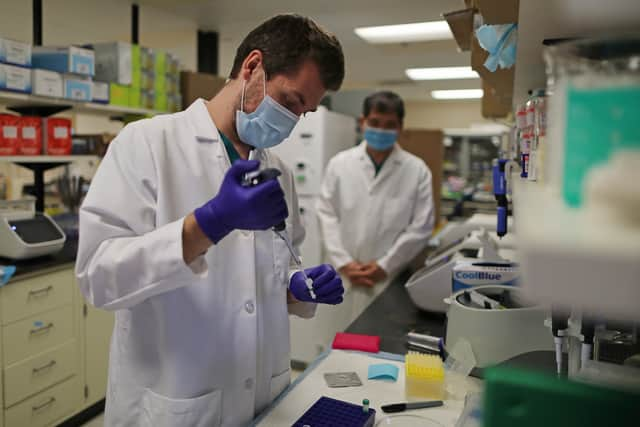What is Disease X? New pandemic virus explained, symptoms, is it coming to UK in 2023 - should we be worried?
and live on Freeview channel 276
The Government has unveiled a cutting-edge vaccine research facility where experts will work to ensure that future pandemics are stopped in their tracks and do not cause the same disruption to daily life as Covid-19.
The Vaccine Development and Evaluation Centre (VDEC) is based at the UK Health and Security Agency (UKHSA) science and defence technology campus Porton Down, near Salisbury in Wiltshire.
Advertisement
Hide AdAdvertisement
Hide AdResearchers will study pathogens that do not currently have a vaccine - like the flu, mpox or hantavirus - or for which immunisation could be enhanced, using live viruses kept on-site in specialised containment facilities.
It is hoped the VDEC will contribute to the 100 days mission - a global goal set by the G7 in 2021 with the aim of deploying a vaccine against any new pandemic threat within 100 days of identification.
It can also help the UK better prepare for new threats, such as "Disease X," a pathogen that has not yet been identified but which experts fear will cause the next pandemic. But what exactly is Disease X, and should we be worried?
What is Disease X?


Disease X is a term introduced in the WHO's 2018 Global Preparedness Monitoring Board report as a way to emphasise the importance of being ready for the emergence of novel infectious diseases that could spread rapidly and have serious public health consequences.
Advertisement
Hide AdAdvertisement
Hide AdIt is used to refer to a hypothetical new disease that could potentially emerge and cause a global pandemic in the future.
It's important to note that Disease X is not a specific disease itself; rather, it's a concept that highlights the need for ongoing research, surveillance and preparedness to identify and respond to potential future pandemics.
It is essentially a placeholder name for any unidentified future pathogens that could potentially cause the next global pandemic, and is not intended to imply that a specific disease with that name will necessarily emerge.
UKHSA chief executive Dame Jenny Harries said the term is used as scientists “don’t know what the next pathogen will be that will cause a pandemic”, and the "X" in Disease X represents the unknown nature of such a disease and the need for preparedness and vigilance.
What are the symptoms of Disease X?
Advertisement
Hide AdAdvertisement
Hide AdSince Disease X is not a real disease but rather a term used to highlight the possibility of a novel and potentially dangerous infectious disease emerging in the future, there are no established symptoms associated with it.
If a new disease were to emerge, its symptoms would depend on the specific characteristics of that disease and its mode of transmission.
How worried should we be about Disease X?
While Disease X is not a real disease, the concept acknowledges that despite scientific advancements and surveillance efforts, there will always be the possibility of new diseases with unpredictable characteristics emerging and spreading globally.
Professor Sir Andrew Pollard, chairman of the Joint Committee on Vaccination and Immunisation, told Sky News there will probably be future pandemics due to factors including climate change.
Advertisement
Hide AdAdvertisement
Hide Ad“Of course, it’s impossible to say exactly when that might happen, but the circumstances that we see in front of us make it very likely.
“For example, we know that climate change drives the emergence of new bacteria and viruses into our environment. And we also have urbanisation. As a result of humans moving more into animal habitats, we increase the risk of that happening.
“As we saw with Covid-19, people crowded together make spread much more likely. We’re currently at about eight billion people on the planet. And over the next 30 years or so we’re going to move to more than 10 billion.
“That does mean that, over the course of the years ahead, it becomes actually increasingly likely there’ll be further pandemics during this century.”
How feasible is the 100 days vaccine mission?
Advertisement
Hide AdAdvertisement
Hide AdDisease X underscores the importance of global health security and the need for countries and international organisations to collaborate in monitoring and responding to potential health threats. It encourages governments and public health agencies to remain vigilant and invest in preparedness measures. It also serves as a reminder that infectious diseases have the potential to rapidly evolve and spread, and that risk assessments should consider not only existing pathogens but also the possibility of novel and as-yet-unknown pathogens.
Sir Andrew called the 100 days mission “a really tall order” that is “going to need a lot of investment to do the research.
"If you look at Covid, it was 300 days to develop a vaccine. The Government want us to be down at 100 days, and that’s a really tall order. It’s going to need a lot of investment to do the research that brings us to that point.”
Asked if the 100 days mission is feasible, Sir Andrew said “20 years of homework” on coronaviruses before the outbreak of Covid-19 had speeded up the development of vaccines for the virus.
Advertisement
Hide AdAdvertisement
Hide Ad“We need, at the very least, to be doing that same amount of research and development around other threats – microbial threats – so that, if it was some other virus, we’re just as prepared as we were with coronavirus.
“But that’s just to get you to 300 days. To get down to 100 days means that development has to go a lot further before a pandemic than what happened with Covid-19.
“And I think with investment you could do that. But we’re way behind a point where we’d be ready for that tomorrow.”
Comment Guidelines
National World encourages reader discussion on our stories. User feedback, insights and back-and-forth exchanges add a rich layer of context to reporting. Please review our Community Guidelines before commenting.
